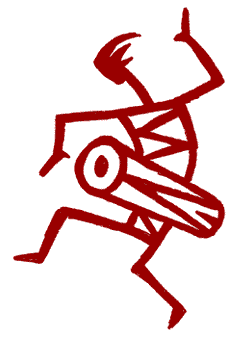

Thought of the Week Archives |
 |

|
|
|
August 4, 2003 Inner Conflict - Part 6: The Importance of Safe Ex-pression In part two of this series the meaning of healing is summarized: "The word 'heal' is from the Old English word 'hal' and the Greek word 'holos,' which both mean 'to make whole or complete.' The word 'religion' is made of the latin roots 're' and 'ligare' (join) which means to re-join, bring together, or unite. These major concepts indicate a natural movement to connect things which have been split apart. When we are split into subpersonalities, it is our nature to move toward unity." The natural drive to heal is not an inevitability, however. It is dependent upon support and the right conditions. When we work with divisive phenomena such as subpersonalities, it is wise to be cautious. Certain techniques can make the situation worse. It is important to realize that the essential problem of emotional dysfunction is caused by a blocking of energy expression. To be healthy, children must express their needs and feelings. These feelings usually need to be expressed toward, and accepted by, the parents. If this expression is neglected, repressed, or attacked, the energy is either misdirected toward other sources (younger siblings, animals, objects) or it is misdirected against the self. The former is called "acting out," and causes interpersonal conflict, and the latter is called "acting in," and causes inner conflict. To heal, the blocked energy needs to return to its origins - toward our parents and caretakers. Unfortunately, this is often not possible due to their age, death, or a continued inability by them to accept feeling expression. Fortunately, this type of limitation does not really hinder the healing process. In a safe environment like a primal session, we can still express ourselves to our original caretakers as if they were there. With a supportive witness, this can allow for the clearing of stagnant, blocked emotions. People who choose to do primal work generally do so as an act of taking responsibility. They feel that they can no longer blame others, or "the world," for all their problems. In essence, when people choose primal they are saying, "I am carrying this problem, and even if it didn't originate in me, it is my responsibility to expel it." This attitude makes sense for those who "act out" and blame others. By doing primal, they balance excess blame by taking greater personal responsibility. Those who have "acted in," however, actually suffer from an excess of self-blame and over-responsibility. They think they are to blame for more than their share. Attacking the self, the major theme in inner conflict, is what these people need to be healed from. With people who act out, primal work redirects the expression away from innocent others - toward the original perpetrators. With people who act in, primal work redirects the expression away from innocent self toward the original perpetrators. The natural, original self was not protected, and primal work is primarily about creating safety for that original self so that it can express and heal. Protection is the key element. Subpersonality work often involves strong expression between the conflicted parts in order to come to resolution. Often a great deal of emotion - grief, sadness, fear, and anger - is tossed back and forth. There are times, however, when inner hatred is so strong that subpersonalities actually want to kill each other. Some therapists believe that the subpersonalities should be allowed to express themselves fully, in the name of "freedom and honesty," no matter how vicious this expression is. One part of the client may attack another part by screaming and hitting a punching bag with enough force to actually kill someone. With this type of expression, a person may feel some relief from the physical venting of tension, but the hidden emotional damage can be serious. Contrary to the "honesty" rationale, this type of vicious attack on the self is not honest. The honest truth is that the client is angry at whoever neglected and hurt them and forced them (as children) to direct their energy at themselves. They may not know it consciously (which, after all, is the hallmark of neurosis) but they are not angry with themselves. Healing is about unity, connection, communication, understanding, and compassion. Vicious self-attack will not promote any of these things. Letting one subpersonality batter another is just as bad therapeutically as letting one spouse batter another. Vicious self-attack can cause more trauma, further personality disintegration, and even episodes of classic split personality. In these cases, violent subpersonalities can come to the fore while battered subpersonalities may slide further from conscious awareness. The key to this work, for clients and therapists to realize, is that repressed emotions, by definition, must come out. That is what the word "ex-pression" means. To heal, anger must be directed outward - in session - and not at the self. Although frustration and anger needs some expression within the conflicted self, the power of this self-attacking expression needs to stay within certain safe levels. Whenever possible, inner-directed expression needs to move toward resolution between the parts in "disagreement." All genuine healing processes, including Primal Integration, follow the essence of the Hippocratic Oath - "Do no harm." If we keep that in mind as we work on these difficult inner conflicts, we will allow the healing process to stay on track. |